Members of the CLEAR programme, which allows passengers to bypass security queues, can now use dedicated lanes at San Jose International Airport.
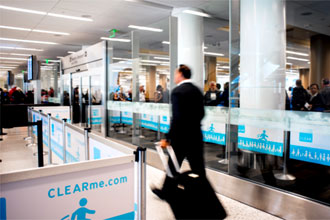

Members of the CLEAR programme, which allows passengers to bypass security queues, can now use dedicated lanes at San Jose International Airport.
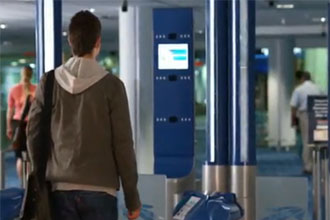
New Zealand Customs Service and Auckland Airport are trialling SmartGate Plus – a one-step biometric e-gate system that enables self-service customs processing.
The Transportation Security Administration (TSA) is planning to make its PreCheck programme widely available at a cost of $85 per passenger.

Human Recognition Systems’ MFlow Journey was recently installed at Edinburgh Airport to measure the journey time of passengers passing through security.
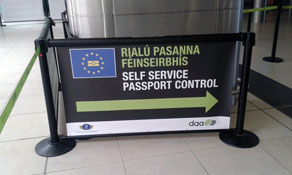
A new pilot at Dublin Airport allows certain arriving passengers to use self-service immigration through automated border control gates.
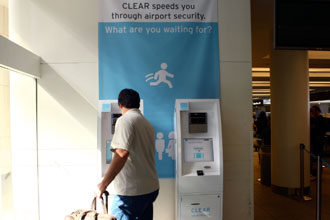
San Antonio Airport is set to become the sixth US airport to install CLEAR kiosks to streamline the security process.
Content plans: AI, IOT & Robotics case studies & knowledge sharing
Find out more >>Content plans: Pittsburgh International Airport presentation, Autonomous operations & Robotics POC updates.
Find out more >>Content plans: Bringing together aviation and robotics industry professionals for a three-day interdisciplinary series of conference sessions, workshops, robotics innovation tours, and networking opportunities with the primary goal of solving aviation business and operational challenges with robotics solutions.
Find out more >>Content plans: Dublin Airport presentation & POC updates, Innovation for delivering successful summer
Find out more >>Content plans: Retailing innovations in Dublin and discussion around progressive new business models.
Find out more >>Content plans: This high-level three-day event in the heart of Dublin, focused on customer-centric innovation, is dedicated to new thinking and concepts, and combines an exhibition, extensive social activities, conference sessions, interactive workshops, pitch sessions and awards with turbo-charged networking.
Find out more >>Content plans: AI, IOT & Robotics case studies & knowledge sharing
Find out more >>Content plans: PoC update, offsite baggage processing, new innovation.
Find out more >>Content plans: PoC update, AI use cases in baggage, new innovation & new member presentation.
Find out more >>Content plans: PoC update, AI, IOT & Robotics case studies & knowledge sharing
Find out more >>Content plans: Enhancing Hub operations through airport/home carrier collaboration – learnings and idea sharing, Innovation in bag imaging for border processing
Find out more >>Content plans: Retailing innovation in Los Angeles and exploring the utilisation of the Metaverse and other new technologies in travel retail.
Find out more >>Content plans: Under the theme of "Transforming Air Transport”, air transport leaders from across the globe will gather in LA to learn, collaborate, and be inspired to elevate their organisation’s passenger experience, business performance, innovation, and sustainability strategies.
Find out more >>Content plans: AI, IOT & Robotics case studies & knowledge sharing
Find out more >>Content plans: Bag tracking, autonomous, automation
Find out more >>Content plans: AI, IOT & Robotics case studies & knowledge sharing
Find out more >>Content plans: Year in review, PoC summary, and plans for 2025
Find out more >>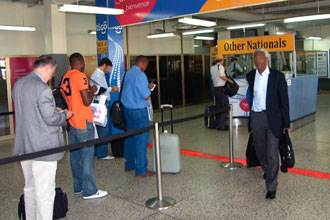
Implementation of a countrywide electronic border management system, based on biometric authentication, is part of the eGhana project to enhance security at airports across the country.
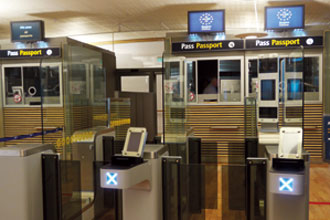
The EasyPass self-service border control system became fully operational at Oslo Airport yesterday, allowing Norwegian travellers to control their own entry to the country using biometric facial-recognition technology.
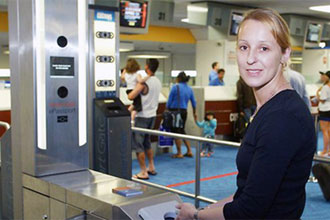
Australian Customs and Border Protection Service’s Robyn Miller spoke to FTE about SmartGate’s US Global Entry trial and the future plans for the project.
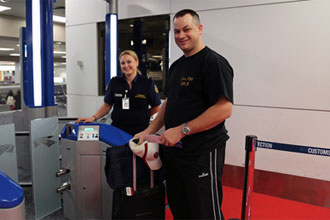
The Australian Customs and Border Protection Service has announced that the automated border control system, SmartGate, is now open to US Global Entry members.

Australian Customs and Border Protection Service’s Robyn Miller spoke to FTE about SmartGate’s US Global Entry trial and the future plans for the project.

The Australian Customs and Border Protection Service has announced that the automated border control system, SmartGate, is now open to US Global Entry members.
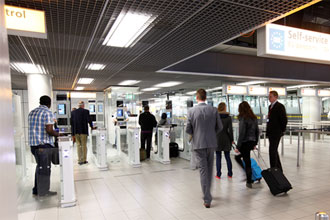
The automated border control system at Amsterdam Airport Schiphol is expected to process its 1-millionth passenger before the end of 2012, just nine months after going live.
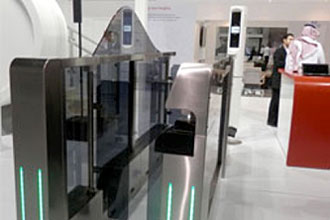
Automated iris and facial recognition systems are to be installed at Dubai Airport’s Terminal 3 to speed-up and secure the immigration process.
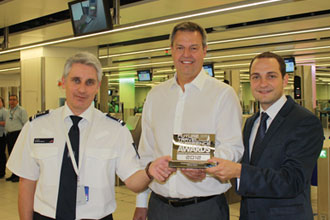
FTE caught up with Scott Stanley, Gatwick Airport’s COO, and Dean Oughton, Assistant Director, Border Force Gatwick, at the airport’s FTE Award celebration.
The Transportation Security Administration’s (TSA) expedited screening programme, PreCheck, has been extended to Philadelphia International Airport.
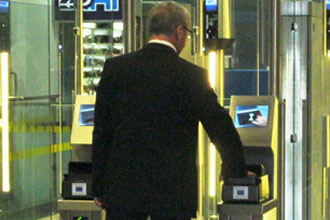
A new e-gate system has been introduced at Sofia Airport, allowing passengers from the EU, EEA and Switzerland to enjoy automated border clearance.
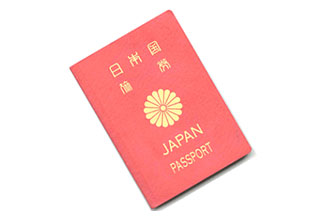
Haneda and Narita airports are testing a new biometric identification system in an attempt to speed-up the immigration process at the two airports.
Get Future Travel Experience news & updates sent to your inbox